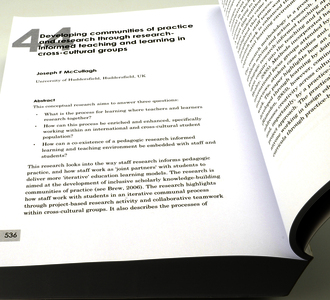This conceptual research aims to answer three questions:
• What is the process for learning where teachers and learners research together?
• How can this process be enriched and enhanced, specifically working within an international
and cross-cultural student population?
• How can a co-existence of a pedagogic research informed learning and teaching environment
be embedded with staff and students?
This research looks into the way staff research informs pedagogic practice, and how staff work as
’joint partners’ with students to deliver more ’iterative’ education learning models. The research is aimed at the development of inclusive scholarly knowledge-building communities of practice (see Brew, 2006). The research highlights how staff work with students in an iterative communal process through project-based research activity and collaborative teamwork within cross-cultural groups. It also describes the processes of working with students and how it has helped to directly reinforce the curricula and informed the author’s own learning and teaching strategies. Significantly, this type of open engagement with cultural groups has alerted the author to howtraditional linear ’Western’ forms of academic research within art and design can be influenced by Eastern models of research enquiry. The research describes a coexistence of practice where research and enquiry can be fluidly exchanged between teacher and student.
Changes were made to curricula to develop a more social constructivist form of working (Gredler,
1997) where both the context in which learning occurs and the social contexts that learners bring
to their learning environment were put centre stage. A short film entitled Event digestion, a
pedagogic filmic picnic, where students came together to form a community event, highlighted
this process. This process was also one of cross-disciplinary staff team-working within art and
design where research work is enhanced through creating a more open social experiential learning
environment.
The research methodology is a predominantly qualitative one through problem solving and action
research. It is also situated within a pedagogic research-informed teaching approach where
teaching draws upon enquiry into the teaching and learning process itself (Jenkins & Healey,
2005). Methods incorporated have been cross-cultural international focus groups attended by
students, ’unstructured’ interviews, student case studies and, importantly, practice-based work.
The paper highlights how an active educational model can be developed through learning by
doing (Gibbs, 1998) and thinking (Ramsden, 2003), however, coming from a perspective which
addresses creativity across cultures (Lubart), is cross-disciplinary, and, importantly, by a practicebase collaborative international team project approach. The practical pedagogic findings will be of use to anyone working in design education wishing to develop cross-cultural curricula through practice-based learning and research.
Downloads
Downloads per month over past year
Downloads per month over past year for
"_DSC7808.jpg"
Downloads per month over past year for
"38_McCullaghx.pdf"

![_DSC7808.jpg [thumbnail of _DSC7808.jpg]](https://eprints.hud.ac.uk/7073/2.hassmallThumbnailVersion/_DSC7808.jpg)

 CORE (COnnecting REpositories)
CORE (COnnecting REpositories) CORE (COnnecting REpositories)
CORE (COnnecting REpositories)